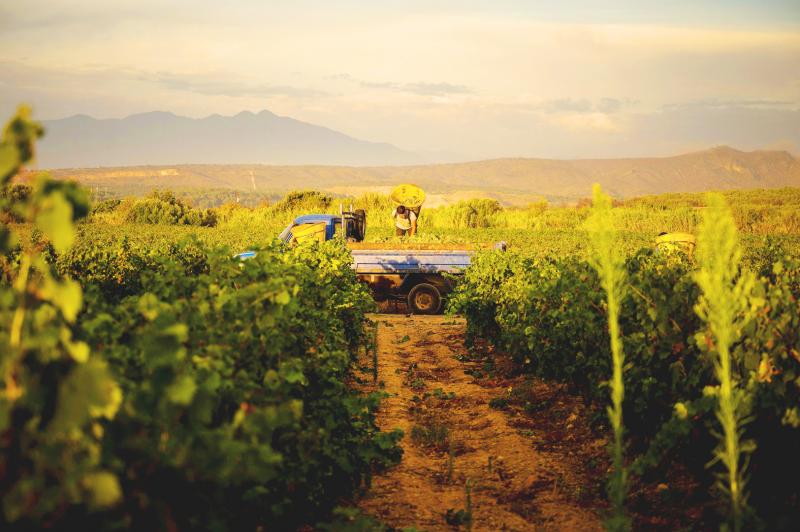Just when it seemed the year could not get more awful for French winemakers, it has gotten worse.
With COVID-19 lockdowns sending sales plummeting, some have had to turn their unsold stock into alcohol disinfectant.
This is all the more depressing because last year was a vintage year in many of the country’s wine regions.

Photo: AFP
However, this year has also brought the creeping specter of climate change into sharp focus, as winemakers were forced to start picking their grapes early this month in parts of southern France — a whole month ahead of the norm two generations ago.
The first signs are not good, with a meager crop riddled with mildew from topsy-turvy weather.
In some vineyards, there are hardly any grapes left to pick.
The Agly Valley, upriver from Rivesaltes, the village which gives its name to the renowned fortified wine, is the sunniest in France, with 300 days of sunshine a year.
Yet even there they have not seen a year like it, with grape-pickers working under blistering temperatures nearing 40°C.
Farmers have been forced to harvest by machine at night or handpick from the crack of dawn to keep the grapes at their cool best.
“It is the first time I have seen anything like this, and I have been working in the vineyards since I was 17,” 68-year-old Jean-Marie Dereu told reporters in his fields 40km from the Spanish border. “When I was young, we started the harvest in September.”
This year it started on Aug. 5.
“We had so much rain in the spring, which was catastrophic, and in the summer the vines were devastated by mildew,” he said.
“Normally, the Tramontane sea breeze blows and dries the vines, but this year there was no wind. And now it’s almost a drought,” said Dereu, who works seven days a week, despite his age.
“This year we are definitely going to lose money,” he added as he climbed onto his tractor.
The French government has said climate change is almost certainly to blame.
The French Ministry of Environment said that on average, harvests across France are taking place 18 days earlier than they were 40 years ago.
This was a clear “marker of global warming,” it added.
In her laboratory in Rivesaltes, oenologist Anne Tixier was worried about the “disturbing” way the rise in temperatures has been affecting wine production as she tested the pressed grape juice straight from the vineyards.
“We are going to end up growing Spanish grape varieties in England” if this continues, she said as she tasted the first small muscat grapes of this year with their distinctive notes of lemon.
“We have been watching harvests get earlier for 30 years,” Tixier added. “We can no longer deny climate change. We have got to think about the future, maybe by using other varieties or hybrids to adapt” to global warming.
Pierre Ruel, whose vineyards are in the village of Salses-le-Chateau, was still passionate about the wine he produces, but admitted that it “would be more profitable to sell my vineyards than to work them.”
Dereu wants to retire, but “no one in my family wants to take it on. The young ones would rather work behind a desk than have to do hard physical labor,” he said.

A beauty queen who pulled out of the Miss South Africa competition when her nationality was questioned has said she wants to relocate to Nigeria, after coming second in the Miss Universe pageant while representing the West African country. Chidimma Adetshina, whose father is Nigerian, was crowned Miss Universe Africa and Oceania and was runner-up to Denmark’s Victoria Kjar Theilvig in Mexico on Saturday night. The 23-year-old law student withdrew from the Miss South Africa competition in August, saying that she needed to protect herself and her family after the government alleged that her mother had stolen the identity of a South

BELT-TIGHTENING: Chinese investments in Cambodia are projected to drop to US$35 million in 2026 from more than US$420 million in 2021 At a ceremony in August, Cambodian Prime Minister Hun Manet knelt to receive blessings from saffron-robed monks as fireworks and balloons heralded the breaking of ground for a canal he hoped would transform his country’s economic fortunes. Addressing hundreds of people waving the Cambodian flag, Hun Manet said China would contribute 49 percent to the funding of the Funan Techo Canal that would link the Mekong River to the Gulf of Thailand and reduce Cambodia’s shipping reliance on Vietnam. Cambodia’s government estimates the strategic, if contentious, infrastructure project would cost US$1.7 billion, nearly 4 percent of the nation’s annual GDP. However, months later,

Texas’ education board on Friday voted to allow Bible-infused teachings in elementary schools, joining other Republican-led US states that pushed this year to give religion a larger presence in public classrooms. The curriculum adopted by the Texas State Board of Education, which is controlled by elected Republicans, is optional for schools to adopt, but they would receive additional funding if they do so. The materials could appear in classrooms as early as next school year. Republican Texas Governor Greg Abbott has voiced support for the lesson plans, which were provided by the state’s education agency that oversees the more than

Ireland, the UK and France faced travel chaos on Saturday and one person died as a winter storm battered northwest Europe with strong winds, heavy rain, snow and ice. Hampshire Police in southern England said a man died after a tree fell onto a car on a major road near Winchester early in the day. Police in West Yorkshire said they were probing whether a second death from a traffic incident was linked to the storm. It is understood the road was not icy at the time of the incident. Storm Bert left at least 60,000 properties in Ireland without power, and closed